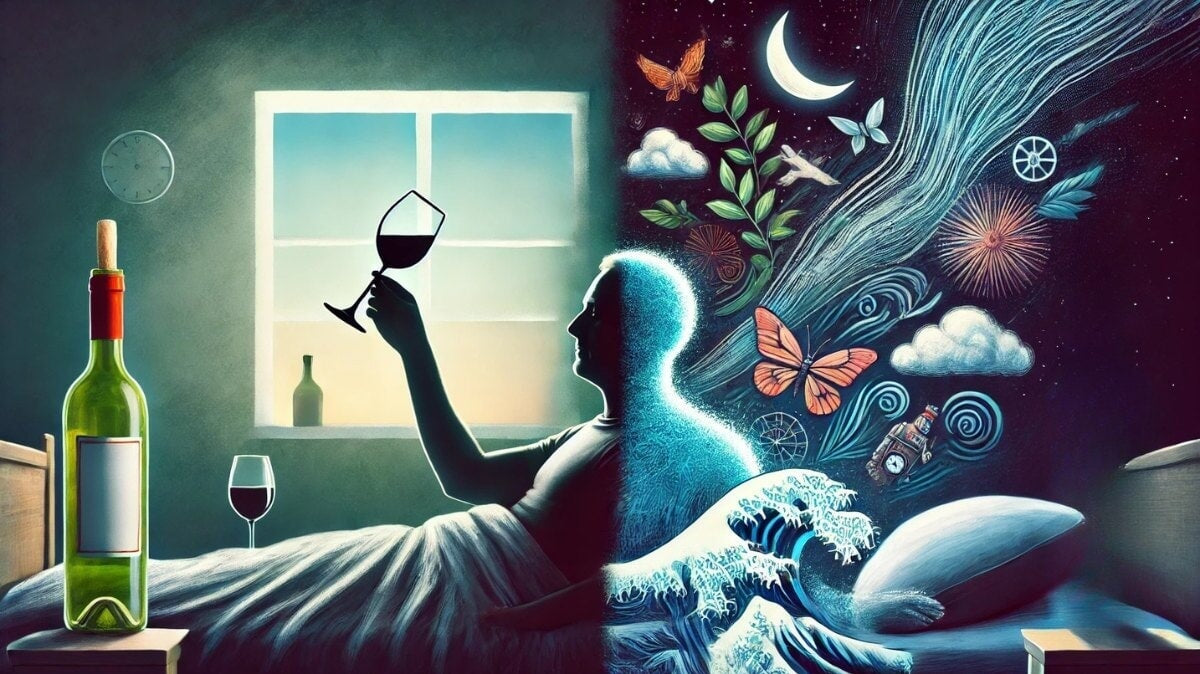When you go to bed are you as snug as a bug in a rug? Or are you more of a doomscrolling ants in your pants wriggler?
Not everyone can fall asleep easily. But don't panic; there are natural remedies to improve your sleep quality.
In our guide we'll look at the ways to improve sleep naturally, and share our top tips for a better snooze.
Why we have trouble sleeping

There are lots of reasons you might struggle to get to sleep. Between emotional upheaval, work, kids, appointments, social media and hyperconnectivity, the dog… it can be hard to get in a few hours of uninterrupted rest.
Our fast-paced lives and daily worries can lead to insomnia or other sleep disorders that further impact your ability to get to sleep.
But deep, restorative sleep is essential for our mental well-being and physical health. So, if you do struggle with falling or staying asleep, it’s important you try to remedy the problem before it further impacts your daily life.
Sleep studies in America
Did you know the average person gets less than the recommended seven hours sleep a night?
And that in America, 50 to 70 million adults suffer from some sort of sleep disorder? That’s 15-21% of the population, or in other words… 1 in 5 people!
Basically, most of us aren’t getting enough sleep, and even when we are, it’s a struggle.
That’s why a 2020 study found 8.4% of US adults take sleep aids every day or nearly every day.
As a species, our attempts to get enough sleep just aren’t working anymore and we need to rectify it.
Here’s how.
Different types of sleep disorder

There are multiple sleep disorders that affect your ability to get 7 hours rest:
- 🥱 Insomnia: This can be occasional or chronic. Sometimes characterized by difficulty in falling asleep, other times by waking up at night or by a feeling of non-recovery after rest.
- 💤 Hypersomnia: Characterized by an excessive need for sleep and episodes of sleepiness during the day.
- 😱 Parasomnias: This refers to various abnormal phenomena that occur during the deep slow-wave sleep phase (somnambulism, bruxism, somniloquy, night terrors) or during REM sleep (violent movements called TCSP, nightmares, sleep paralysis).
- 🤿 Sleep apnea: This is a respiratory disorder causing involuntary pauses in breathing lasting a few seconds during the night, due to obstruction of the throat by the tongue and relaxation of the pharyngeal muscles.
- 🦵 Restless leg syndrome: Characterized by an irrepressible need to move the legs, associated with, or provoked by, unpleasant sensations in the lower limbs.
- 🕰️ Circadian rhythm disorders: These, such as Delayed Sleep Phase Syndrome involve a shift in the internal clock and in the sleep-wake rhythm (the desire to go to bed very late or too early) due to the incorrectly timed secretion of melatonin, the sleep hormone naturally produced by our brain to aid sleep.
The causes of sleep disorders

30% of American adults have symptoms of insomnia with 10% having such severe insomnia it impacts their daily lives.
On top of that, the same studies found sleep apnea affects 9%-28% of the population.
Overall, our issues with sleep aren’t just impacting our health, they’re also impacting our wallets. In 2022 sleep related issues cost Americans $16 billion in medical bills.
One of the big reasons for this is the difficulty in falling asleep. While it should take less than 20 minutes to fall asleep, most of us take up to 40 minutes on weekdays and 28 minutes at weekends.
But why do we struggle so much with falling asleep?
Some of the reasons are obvious and simple: consuming stimulants like nicotine, alcohol or caffeine before bed, eating heavy meals late at night, intense physical activity, or long hours spent in front of screens absorbing artificial blue light which affects our ability to sleep.
You should also pay attention to your actual sleeping space, as lighting and temperature can impact your ability to fall asleep.
And, if you’re a woman its unfortunately worse. Any hormonal imbalances or events that cause the body to change internally, like menopause or pregnancy, can also deeply disrupt your nighttime sleeping pattern.
However, the main reason we can struggle to sleep, according to studies at INSV/MGEN, is the impact of mental health issues like stress or anxiety.
A third of those surveyed suffered from anxiety, while 15% showed signs of depression. Both of which go hand in hand with a poorer sleeping pattern.
The consequences of sleep deprivation

In addition to general fatigue, sleeping poorly can impact health in a variety of ways, leading to:
- 🤔 Difficulties with concentration, memorization, alertness and learning
- 😠 Mood fluctuations (irritability, low energy, stress, tension, depressive symptoms...)
- 🍫 Increased appetite and therefore weight gain associated with reduced physical exercise
- 🦠 Reduced immunity, making the body more vulnerable
- 🤯 Headaches
- 🫀 Increased risk of cardiovascular disease (heart attack, hypertension, stroke) and type 2 diabetes
Natural ways to sleep better: Top tips

There are several changes to your routine and habits that will positively impact your sleep:
😴 Listen to your body when it tells you it’s sleepy
We’ve gotten really good at ignoring our bodies' natural signals.
The first thing to do when you want to sleep better is to listen to your sleep rhythm and go to bed as soon as the first signs of fatigue or drowsiness appear (yawning, itchy eyes, heavy eyelids, etc.).
Otherwise, you risk missing the "sleep train" and you will have to wait for the next one. FYI, it passes every 90 minutes (duration of a sleep cycle); which at midnight can be a long time!
🥰 Create a calming, sleep-friendly routine

There's nothing better than establishing a bedtime ritual to help you sleep like a baby!
In the evening, create an appropriate atmosphere that prepares you for sleep. For example, engage in calm and relaxing activities, such as reading, listening to soft music that promotes relaxation and prepares the body and mind for rest. That means no heavy screamo at 11pm, sorry metalheads.
Opt for soft lighting.
Also try to go to bed and get up at the same time every day (weekdays and weekends if possible) to help regulate your internal clock and create a solid sleeping pattern.
🛌 Optimize your sleeping environment

You may not necessarily think about it, but it can really improve your nights.
First, make sure you have a good mattress and a comfortable pillow, adapted to your sleeping position.
Pay attention to the temperature of your room. The ideal temperature for falling asleep well should be around 64° and should not exceed 68°.
Choose your sheets wisely by opting for soft and breathable materials. Soft cotton helps you feel as snuggly as a baby wrapped up for bed.
Adjust the brightness throughout the evening and favor warm, ambient lights to help your brain understand that it is almost time to go to bed. Once in bed, you should be in complete darkness (you can use a sleep mask.
Finally, don't hesitate to consult our selection of the best sleep accessories to give you a helping hand.
🥬 Look at your diet

Not trying to shame anyone who loves sweets or crisps – we certainly do. But unfortunately, they’re not necessarily conducive to falling asleep.
You may not know this, but diet plays a very important role in the quality of sleep.
To begin with, get into the habit of eating a light dinner in the early evening, at least two hours before bedtime.
Try to include foods rich in tryptophan (eggs, dairy products, dried vegetables, bananas, poultry, rice, soy, etc.), in your evening meal. They help promote the production of melatonin - the necessary partner for sleep.
Foods rich in magnesium (dark chocolate, legumes, spinach, whole grains), omega-3 (oily fish, vegetable oils from rapeseed, flax, walnuts, etc.), vitamin B (green leafy vegetables) are also beneficial to falling asleep and can be incorporated into evening meals.
🧘 Learn to manage your stress and anxiety

Stress unfortunately has a lot to answer for. It impacts our mental and physical health, and disrupts our ability to get a good sleep.
We have a whole detailed article designed to help you get to sleep when you're stressed .
To help reduce feelings of anxiety or stress there are some tricks you can try at home, like relaxation exercises (deep breathing exercises, stretching, muscle relaxation, yoga), or meditation.
If, however, your stress is debilitating and none of these remedies seem to have an impact, always consult a health professional who can better support you.
🍵 Use natural herbal remedies

Herbal medicine consists of using plant extracts and natural active ingredients as a treatment. This can be beneficial for those of us looking to get more rest but want to avoid taking sleeping pills.
Some plants have natural sedative properties.
You can take them in the form of herbal teas, capsules or tablets. The most recommended are valerian, passionflower, hops, lemon balm, escholtzia, hawthorn, chamomile, poppy, linden and verbena.
🪻 Use essential oils

To help you fall asleep, aromatherapy can also be an option. Certain essential oils are known for their beneficial effects on sleep.
The best known for their soothing and relaxing properties are lavender, Roman chamomile, bitter orange, marjoram and bergamot.
You can diffuse them directly in your room or take them orally (herbal teas, food supplements).
📵 Give up some bad habits

Unfortunately for all of us, poor lifestyle habits can have a significant impact on the quality of sleep.
For a good night's sleep, avoid stimulants (coffee, tea, alcohol, tobacco) as much as possible at the end of the day and in the evening, large and heavy meals based on fatty, sugary or industrial foods which cause difficult digestion.
Also, no midnight gaming! Turn off all screens at least an hour and a half before going to sleep so that the blue light does not inhibit the production of melatonin .
And if you can’t face missing the latest Rings of Power, at least get yourself glasses that filter artificial light. Luckily, we have several glasses collections that you can check out.
How to improve sleep naturally: Final thoughts
Difficulty falling asleep is becoming more and more common and affects more and more people.
They can be linked to poor lifestyle, and the negative impacts of screens, but stress and anxiety-depressive disorders are generally the main culprits for this deterioration in our sleep.
However, it is possible to say goodbye to poor sleep without necessarily resorting to sleeping pills.
Natural methods such as stress management through meditation or yoga, a diet that helps you fall asleep, regular exercise, establishing a bedtime ritual and an environment conducive to sleep are all helpful.
If you’re a fan of turning to natural substances, using plants and essential oils that help promote quality sleep are excellent solutions to finally have peaceful nights.
Once you’ve finally fallen asleep, of course, you want to also stay asleep throughout the night. For that, check out our article on how to improve your sleep quality in 10 easy steps.
Night, night, don’t let the bedbug’s bite!















